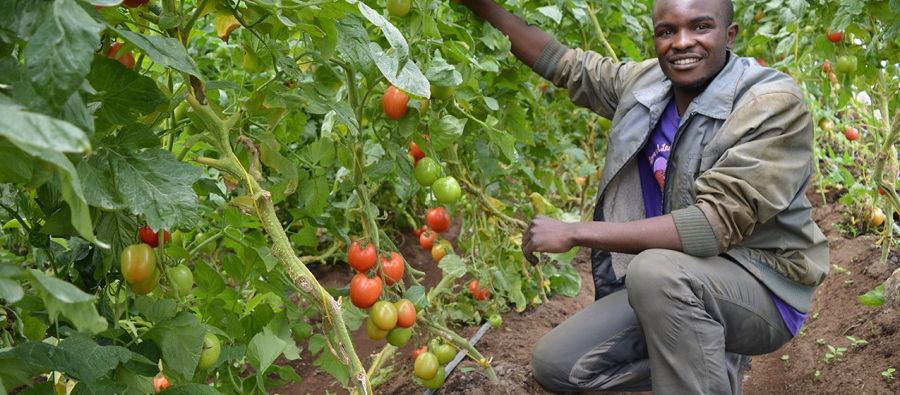Growing up in Mbeya, Tanzania, Samson Makenda loved tomatoes, and when he took over a small plot of land as a young man, he thought he could make a living with the crop. He started growing tomatoes the way his neighbors always had, watering the plants by hand, and using the same seeds and fertilizers they did. But in the crowded local market, he struggled to sell what he harvested, earning just $40 per month.
Creating better economic opportunities for young people like Samson is of vital importance to Africa’s economies. Fewer than one-third of young people in Sub-Saharan Africa have a stable, wage-paying job, and the region will add 11 million new people to its workforce this year. Agriculture can play an important role in creating these opportunities, but only if young people are able to innovate, adopt new technologies, and test new models. To do that, they must be able to identify business opportunities, have confidence in themselves and their ideas, and access the finance and connections they need to put these ideas into practice.
The Strengthening Rural Youth Development through Enterprise (STRYDE) program, a partnership between the Mastercard Foundation and nonprofit organization TechnoServe, is helping to create those conditions. Through a combination of training on personal effectiveness, planning, and basic business skills, as well as tailored aftercare to provide young people with networks and practical skills, STRYDE is empowering thousands of young people across rural East Africa to find better economic opportunities.
Seeing the farm as a business
Many young people fail to recognize the business opportunities that surround them and are within reach, and to address this obstacle, the STRYDE program provides training to help rural youth see their family farms and other assets as a potential source of livelihood.
That lesson was transformational for Ndinagwe Mboya, another young person from Mbeya. Her family used to incubate chicken eggs for others, but the business was not particularly successful. After going through the STRYDE program, Ndinagwe came to recognize that there was an opportunity to build upon her family’s experience, however, and create something more successful. With $165 of seed funding she won through STRYDE’s business plan competition, she purchased eggs and started a business of raising chickens on her own.
“Before STRYDE nobody sought my advice on anything, not even my family. But today I am the go-to-person on matters poultry and incubation,” she said. With her earnings, Ndinagwe helps to pay her siblings’ school fees and is saving to attend university.
A toolbox for change
While young people are often familiar with new ideas and technologies, they face obstacles to adopting them. To take new ideas and make them a reality, as Ndinagwe did, young entrepreneurs need a toolbox for change: confidence, connections, and skills. The STRYDE curriculum includes a section on personal effectiveness, which helps young people to chart their personal strengths and weaknesses, create a plan for their future, and practice interpersonal communication, generating confidence.
Mentorship and aftercare can help entrepreneurs to develop specialized agricultural skills and make important connections. Many ideas also require an investment—like Ndinagwe’s cash grant—to implement, so access to finance is an important factor.
After Samson graduated from the STRYDE program, he began to look around for opportunities to improve his tomato farm. He had noticed that someone had built a greenhouse in the region, and he began to study whether such a facility could help make his business more profitable. Many young people are constrained by a lack of land for farming, so greenhouses and vertical gardens can improve production. As Samson discovered, growing his tomatoes in controlled conditions could also help differentiate them from the other growers.
Samson went to work putting his plan into action. Even a low-cost greenhouse cost more money to build than he could finance himself, so he identified a successful local businessman who could become his partner in the venture. Samson was able to convince him to invest in the project, and together they built the greenhouse and implemented other technical improvements, like drip irrigation, the use of hybrid seeds, and a careful application of organic and chemical fertilizers. Samson’s tomato plants are more productive now, and the fruit has fewer defects and blemishes, so he is able to sell it easily to local markets, restaurants and hotels at premium prices. Now, he earns up to $300 per month.
“For people around here, this is new tech for them, so they want these tomatoes,” says Samson. He has diversified his earnings by launching a crop nursery business, as well.
Samson and Ndinagwe are just two of more than 48,000 young people benefiting from the STRYDE program. The program has shown that simple changes in how young people think about the opportunities around them and how to adopt innovation can make a big difference, and the average participant has seen their income increase by 133 percent.
But with Africa’s growing youth workforce, more work remains to be done. The STRYDE program has worked to build the capacity of vocational training centers, schools, prisons, and other institutions across East Africa to deliver the curriculum. Local partners like these will be critical in ensuring that more young people can recognize and seize opportunities for a better living.



